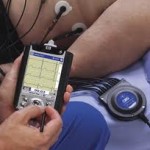Atrial fibrillation (AF) or known also as heart rhythm disturbance is the most common problem affecting up to 500,000 people in the UK.
Although not usually in itself life-threatening, tracing back the disease manifestation is through electrocardiogram (ECG).
Close scrutiny into nearly 50,000 patients’ records found that AF after a stroke more than doubles the risk of dementia.
UK experts believe, that treating stroke survivors with atrial fibrillation might prevent many patients from going to develop dementia.
Blood-thinning drugs and medication to slow the irregular heartbeat are often prescribed to reduce stroke risk.
“The results may help us identify potential treatments that could help delay or even prevent the onset of dementia” according to lead researcher, Dr. Phyo Kyaw.
Fifteen separate case studies were analyzed and they found that stroke survivors with AF were 2.4 times more likely to develop dementia than stroke survivors who did not have the heart condition.
About 25 percent of patients with stroke and atrial fibrillation were found to have developed dementia during follow-up.
Lead researcher Dr Phyo Kyaw said: “These results may help us identify potential treatments that could help delay or even prevent the onset of dementia.”
“Options could include more rigorous management of cardiovascular risk factors or of AF, particularly in stroke patient,” he added.
Rebecca Wood of Alzheimer’s Research UK said: “While this paper shows there is a link between atrial fibrillation and dementia, we don’t yet know if treating atrial fibrillation will prevent or delay the onset of dementia.
The work appears in Neurological Journal.
